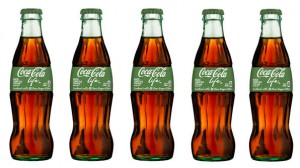This comment is in response to Crispin Mwanyumba’s blog comment: ‘Coca-Cola Life’ (https://blogs.ubc.ca/cmwanyumba/)
Coca Cola, the world-known soft drink company that offers more than 750 beverages just in North America; invented by the American pharmacist John Pemberton in the late 19th century and made a national icon in the U.S.A in its 50th anniversary.[i] This company does not accept defeat and this can be seen in Peru where the competing soda was ‘Inca Kola’ and surprisingly enough, this local soda was making more sales than Coca Cola. So instead of accepting this, Coca Cola decided to buy the Inca Kola trademark, which now they own all over the world except in Peru, were they are only partners of Corporacion Ina Kola Peru S.A.[ii]
Moving on, as Crispin clearly stated, “people are becoming more health conscious and consuming much healthier beverages.” Plus he also mentions the decline in the sales of soda sales. Hence, Coca Cola decided to reach these new era consumers by offering Coca-Coca life and clearly changing its brand image from red to green. I agree with Crispin when he mentions that changing its colour will make Coca Cola lose its identity and that it will be very hard for them to convince their consumers about this change. Nonetheless, the ‘Coca Cola Life to make U.S Debut’ remarks that they have done successful launches in Argentina, Chile, Greath Britain and Mexico. Evidently, this shows that the mind of the customers can be changed and with media and publicity as strong as Coca Cola’s, anything can be possible. In addition, even though they are losing their identity, this doesn’t mean it is a bad thing because some old-fashioned consumers that aren’t as health conscious will see Coca Cola as the classic soda Red brand and on the other hand, the new era consumers will see Coca Cola as the green brand with natural sweeteners and eco-friendly label.
Crisping accurately points out that Coca Cola is entering a new niche, joining the natural drinks like juices and although there is a harsh competition of suppliers, I believe that Coca Cola will and is finding a way to smoothly enter this new market segment because first of all, Coca Cola has a very high reputation globally and buyers will trust them as Coca Cola is trying to show a new face, a new identity, a green image. To sum up, I believe that Coca Cola will boost soda sales in this new niche and that it will become one of the fearest competitors.

[i] The Top 10 Bestselling Soft Drinks – TheRichest. (n.d.). Retrieved from http://www.therichest.com/rich-list/most-popular/the-top-10-bestselling-soft-drinks/
[ii] The Coca-Cola Company and Corporacion Inca Kola Announce Global Partnership for Inca… — re> LIMA, Peru, Feb. 23 /PRNewswire/ –. (n.d.). Retrieved from http://www.prnewswire.com/news-releases/the-coca-cola-company-and-corporacion-inca-kola-announce-global-partnership-for-inca-kola-brands-75034032.html


